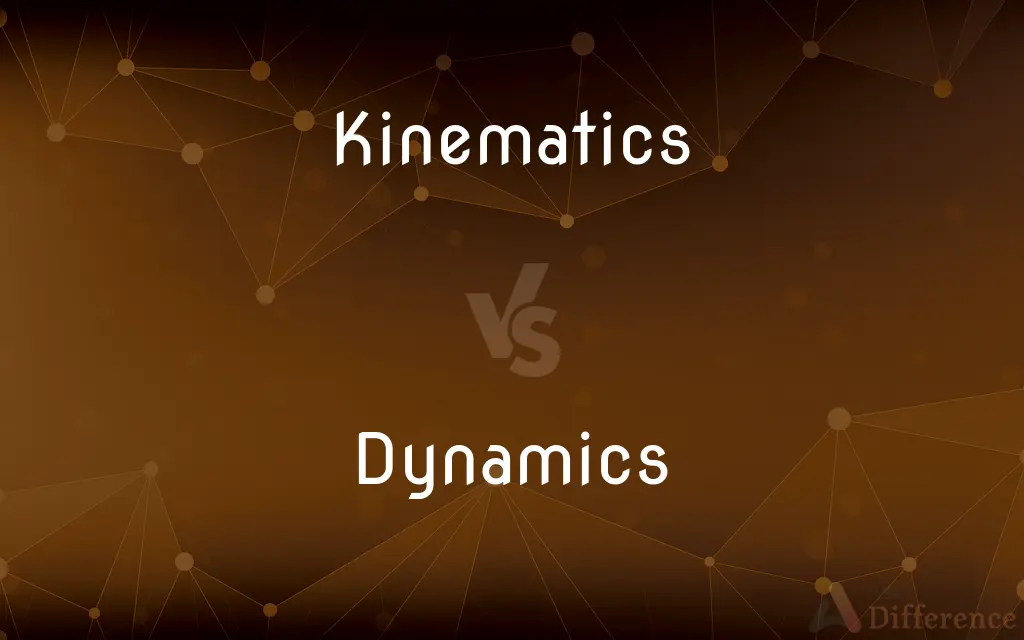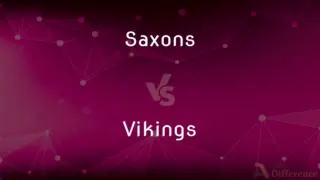Kinematics vs. Dynamics — What's the Difference?
By Tayyaba Rehman — Updated on October 30, 2023
Kinematics is the study of motion without considering its causes. Dynamics is the study of motion and the forces causing it.

Difference Between Kinematics and Dynamics
Table of Contents
ADVERTISEMENT
Key Differences
Kinematics focuses on describing motion through parameters like velocity and acceleration. Dynamics deals with the forces and torques causing the motion.
In kinematics, the cause of motion is not considered. Dynamics, however, analyzes why an object moves, attributing it to forces.
Kinematics uses mathematical equations for motion description. Dynamics involves Newton's laws of motion to explain forces and motion.
Kinematics is about the "how" of motion. Dynamics answers the "why" behind the motion.
Examples of kinematics include projectile motion analysis. Dynamics can be seen in analyzing the forces in a car engine.
ADVERTISEMENT
Comparison Chart
Focus
Motion description
Forces causing motion
Causes of Motion
Not considered
Analyzed and considered
Use of Forces
Ignored
Central to study
Mathematical Approach
Equations for motion parameters
Newton's laws of motion
Practical Example
Calculating a ball's trajectory
Determining forces in a crashing car
Compare with Definitions
Kinematics
Examining how objects move.
Kinematics helped understand the ball's trajectory.
Dynamics
Analyzing motion causes.
Dynamics explains why the pendulum swings.
Kinematics
Investigating speed changes.
Kinematics explores how quickly the car accelerates.
Dynamics
Considering rotational forces.
Dynamics helps design more efficient wind turbines.
Kinematics
Motion without considering forces.
Kinematics describes the roller coaster's speed, not why it moves.
Dynamics
Studying forces in balance.
Dynamics assesses the stability of a bridge.
Kinematics
Concentrating on positional changes.
Kinematics reveals the drone's path.
Dynamics
Utilizing Newtonian mechanics.
Dynamics examines the forces in a collision.
Kinematics
Formulas describing motion.
Kinematics uses equations to predict a planet's orbit.
Dynamics
(used with a sing. verb) The branch of mechanics that is concerned with the effects of forces on the motion of a body or system of bodies, especially of forces that do not originate within the system itself. Also called kinetics.
Kinematics
Kinematics is a subfield of physics, developed in classical mechanics, that describes the motion of points, bodies (objects), and systems of bodies (groups of objects) without considering the forces that cause them to move. Kinematics, as a field of study, is often referred to as the "geometry of motion" and is occasionally seen as a branch of mathematics.
Dynamics
(used with a pl. verb) The forces and motions that characterize a system
The dynamics of ocean waves are complex.
Kinematics
The branch of mechanics that studies the motion of a body or a system of bodies without consideration given to the forces acting on it.
Dynamics
(used with a pl. verb) The social, intellectual, or moral forces that produce activity and change in a given sphere
The dynamics of international trade have influenced our business decisions on this matter.
Kinematics
(physics) The branch of mechanics concerned with objects in motion, but not with the forces involved.
Dynamics
(used with a pl. verb) Variation in force or intensity, especially in musical sound.
Kinematics
The science which treats of motions considered in themselves, or apart from their causes; the comparison and relation of motions.
Dynamics
(used with a sing. verb) Psychodynamics.
Kinematics
The branch of mechanics concerned with motion without reference to force or mass
Dynamics
(mechanics) The branch of mechanics that is concerned with the effects of forces on the motion of objects.
Dynamics
(music) The volume of the sound, such as piano, mezzo piano, mezzo forte, and forte.
Dynamics
Forces that stimulate growth, change, or development.
The changing dynamics in international politics led to such an outcome.
Dynamics
That branch of mechanics which treats of the motion of bodies (Kinematics) and the action of forces in producing or changing their motion (kinetics). Dynamics is held by some recent writers to include statics and not kinematics.
Dynamics
The moving moral, as well as physical, forces of any kind, or the laws which relate to them.
Dynamics
That department of musical science which relates to, or treats of, the power of tones.
Dynamics
The branch of mechanics concerned with the forces that cause motions of bodies
Dynamics
Looking at kinetic and potential energy.
Dynamics investigates the energy conversions in a roller coaster.
Common Curiosities
What does kinematics focus on?
It focuses on describing motion without forces.
Are both fields part of physics?
Yes, they're essential branches of physics.
What is dynamics mainly about?
It studies the forces causing motion.
Is force analysis part of dynamics?
Yes, it's a key aspect of dynamics.
Does kinematics consider why things move?
No, it only describes how things move.
Can kinematics describe a car's speed?
Yes, but not the reasons for its speed.
Does dynamics use Newton's laws?
Yes, they are fundamental to dynamics.
Is kinematics important in animation?
Yes, for animating realistic motion.
Is torque studied in dynamics?
Yes, especially in rotational systems.
Do engineers use dynamics?
Absolutely, in designing and analyzing systems.
Is kinematics simpler than dynamics?
It's generally less complex, as it ignores forces.
Can dynamics help in accident analysis?
Yes, by examining forces involved in impacts.
Does kinematics involve energy?
It doesn't directly deal with energy concepts.
Can kinematics predict projectile paths?
Yes, it's commonly used for that.
Do dynamics principles apply to space?
Absolutely, they're crucial in astrophysics.
Share Your Discovery

Previous Comparison
Saxons vs. Vikings
Next Comparison
Software vs. ApplicationAuthor Spotlight
Written by
Tayyaba RehmanTayyaba Rehman is a distinguished writer, currently serving as a primary contributor to askdifference.com. As a researcher in semantics and etymology, Tayyaba's passion for the complexity of languages and their distinctions has found a perfect home on the platform. Tayyaba delves into the intricacies of language, distinguishing between commonly confused words and phrases, thereby providing clarity for readers worldwide.














































